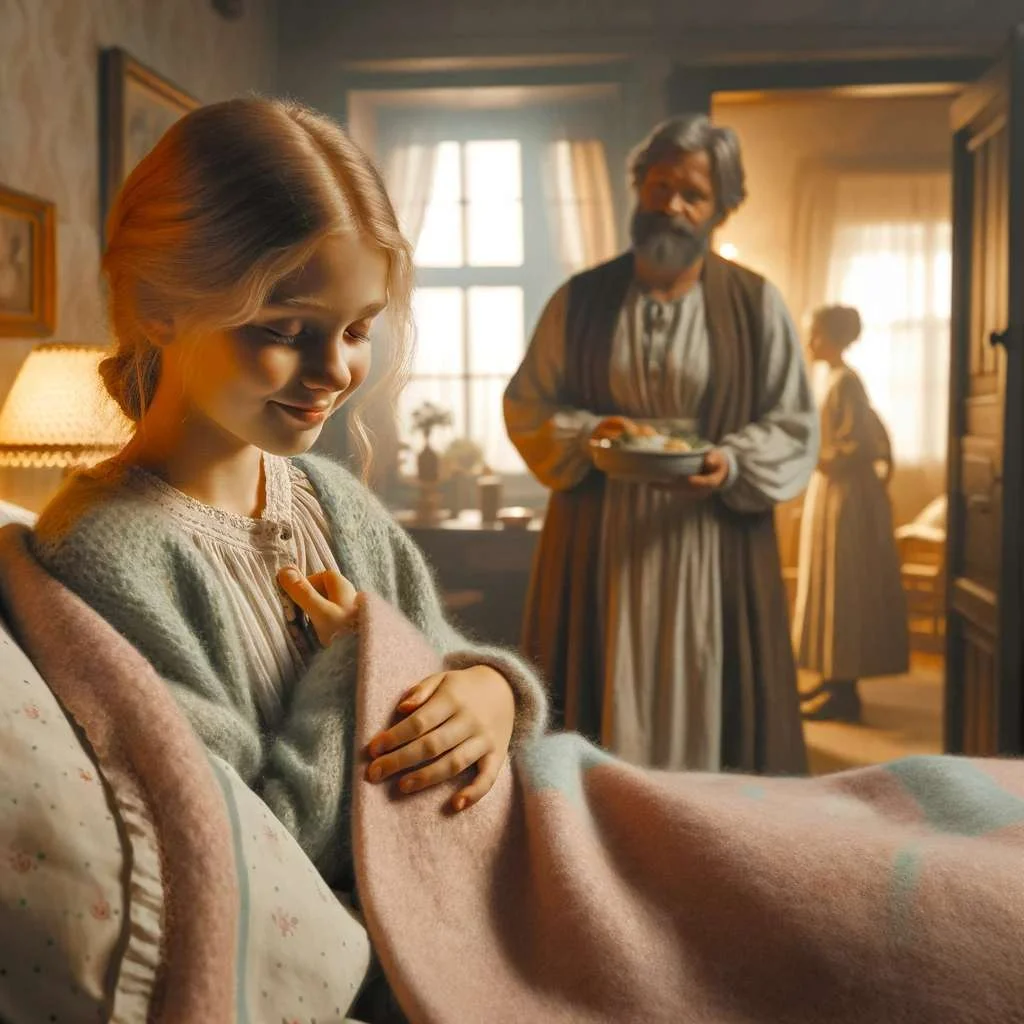An Angel in Disguise is a short story by T.S. Arthur. The story is a heartwarming tale about kindness, compassion, and the transformative power of love. Here is my retelling of the story.
In the small, worn-down hut at the village’s edge, tragedy had struck. A mother, long lost to her battles with vice and intemperance, lay lifeless, leaving her children in a world of cold uncertainty.
Her final moments came abruptly, succumbing to a drunken stupor on her own doorstep, her young, terrified children witnessing her collapse.
In the wake of her death, a wave of somber reflection washed over the village. This woman, once the target of scorn and harsh words, now became a symbol of pity as news of her demise spread in hushed tones.
The villagers, who had once turned their backs in disdain, now hurried to the ramshackle shelter that barely protected her family from the harshness of the elements.
They brought grave-clothes for a dignified burial and food for her starving children, who stood lost amidst the chaos.
The eldest, John, just twelve, was strong and capable, already seeming ready to take on a man’s work. Kate, not yet eleven, sparkled with a cleverness that promised much if nurtured right.
But little Maggie, the youngest, bore the brunt of life’s cruelty. A tragic fall had left her spine damaged, confining her to bed, her world limited to the arms of her now-gone mother.
The village’s concern soon centered on the fate of these orphans. “What is to be done with the children?” became the question on every lip. The mother would soon be laid to rest, her struggles and existence fading from the villagers’ minds. But the children, especially the bedridden Maggie, couldn’t be forgotten.
Farmer Jones, after a thoughtful discussion with his wife, agreed to take in John, seeing potential in the boy’s strength. Mrs. Ellis, who had been on the lookout for help, decided to take Kate under her wing, though she was younger than preferred. They saw this as a charitable act, a chance to mold these young lives anew.
Mrs. Ellis, with a tone mingling reluctance and duty, sighed, “I could do much better, I know. But since no one else will take her, I suppose I must. Though I expect troubles; she’s an undisciplined child, used to having her way.”
Yet, for little Maggie, no offers of shelter came. The village’s sympathy seemed to halt at the threshold of genuine action. Pitying eyes fell upon her frail form, but hearts remained closed.
Villagers brought clean garments, replacing her tattered clothes, yet this act of kindness felt hollow against the backdrop of her abandonment. Her sad, patient eyes seemed to search for a savior among familiar faces, but found none willing to extend a hand to a bed-ridden child.
A gruff voice in the crowd suggested, “Take her to the poorhouse. Nobody here can be burdened with her.”
This notion stirred unease, even among those who had remained indifferent. “The poorhouse is no place for a child so fragile,” another objected.
“For your child or mine, perhaps not,” retorted the first speaker with a dismissive air. “But for this one, it’s a sanctuary compared to what she’s known.”
Though his words carried a harsh logic, they left a bitter taste. The following day, the village hastily buried the mother, an unceremonious farewell to a life of sorrow.
Farmer Jones whisked John away in his wagon, and Mrs. Ellis, with brisk efficiency, separated Kate from her younger sister, urging a swift goodbye.
The crowd dispersed, each avoiding the weight of Maggie’s gaze, until she was left in desolate solitude.
On the edge of the scene, Joe Thompson, the village wheelwright, lingered. He exchanged a troubled glance with the blacksmith’s wife, who was quick to dismiss the problem. “Take her to the poorhouse,” she insisted, hurrying away.
Joe stood motionless, the scene haunting him. Compelled by a tug at his heart, he turned back to the desolate hovel. Inside, he found Maggie propped up, her eyes wide with fear, fixed on the empty doorway.
“Mr. Thompson!” she gasped, her voice trembling. “Please, don’t leave me here all alone!”
Despite his rough exterior, Joe Thompson, the village wheelwright, harbored a tender heart, especially for children. His workshop, a haven for the village’s youngsters, often echoed with the sounds of laughter and chatter as he repaired their sleds and wagons, asking nothing in return but their smiles.
“No, dear,” Joe’s voice was gentle as he approached Maggie, his large hands surprisingly delicate as they wrapped her in clean bedclothes brought by a kind-hearted neighbor. With care that belied his sturdy frame, he cradled the frail child and carried her across the field that separated the hovel from his own abode.
Mrs. Thompson, known more for her stern demeanor than for maternal warmth, watched through the window, her expression tightening as Joe approached with his unexpected burden. She met him at the gate, her posture rigid with apprehension.
“What is that?” she demanded sharply.
Joe felt Maggie flinch against him and offered his wife a look that pleaded for patience and compassion. Without a word, he carried Maggie inside, laying her gently in the small chamber on the first floor.
“You brought that sick child here!” Mrs. Thompson’s voice was a mix of disbelief and indignation.
Joe, usually a man of few confrontations, met his wife’s fiery gaze with a newfound resolve. “It seems to me,” he began, his voice steady, “that women’s hearts can be surprisingly hard.”
“Hard? Our hearts?” she retorted, taken aback by his uncharacteristic assertiveness.
“Yes. Today, every woman at the funeral turned away from Maggie, left her all alone after her mother was taken away. ‘Send her to the poorhouse,’ they said.”
“And why didn’t you?” she challenged.
“She can’t walk there, Jane. Someone needed to carry her, and I was there,” Joe’s voice softened. “But I couldn’t just leave her at the poorhouse steps like an unwanted parcel.”
Mrs. Thompson’s impatience was palpable. “So when will you go to the Guardians for a permit?”
“Tomorrow,” Joe replied, his tone suggesting there was no urgency.
“Why wait? Get it over with tonight!”
Joe paused, his next words heavy with emotion. “In the Bible, there’s much about caring for children. About kindness and compassion. It’s a small thing to offer her shelter for one night, to show a bit of kindness to someone who has known so little.”
As he spoke, his eyes glistened with unshed tears. Mrs. Thompson, for once, found no quick retort. A flicker of something softer glimmered in her eyes.
“Please, Jane, just for tonight. Consider her loneliness, her pain. She’s lost everything.”
His words, laden with a rare eloquence born of genuine concern, hung in the air, tugging at the edges of Mrs. Thompson’s usually guarded heart.
Mrs. Thompson’s response was silent, but her actions spoke volumes. She drifted towards the chamber where Maggie lay, gently pushing the door open. Joe, sensing a shift in her demeanor, chose not to follow, giving space for whatever might unfold. He retreated to his shop, losing himself in work until dusk beckoned him home.
As he neared the house, a light from the chamber window caught his eye, a hopeful sign. Joe paused outside, peering through the window. There, he saw Maggie, propped up slightly, her face illuminated by the lamp’s glow. Mrs. Thompson sat beside her, her back to the window, engaged in quiet conversation. From Maggie’s expression – one of sadness but not despair, Joe sensed a tender interaction, a relief washing over him.
Upon entering the house, Joe didn’t immediately visit the chamber. Instead, he busied himself in the kitchen until his wife emerged, her usual sharpness absent from her voice.
“Supper’s nearly ready,” she said, more gently than usual.
After cleaning up, Joe made his way to Maggie’s side. The child’s bright eyes met his, reflecting a mix of tenderness and gratitude. Joe engaged in a soft conversation, discovering more about Maggie’s condition and offering comforting words.
Her pain seemed lessened by the care she was receiving, a fact that brought a quiet satisfaction to Joe’s heart.
Later, as Mrs. Thompson entered with a simple but lovingly prepared meal for Maggie, Joe observed the interactions. His wife’s attempt at indifference couldn’t mask the gentle care she showed the child.
The gratitude in Maggie’s eyes seemed to rekindle a long-dormant warmth in Mrs. Thompson.
The next morning, over breakfast, Joe broached the topic of Maggie’s future. “I suppose I should see the Guardians about her,” he said, a hint of reluctance in his voice.
Mrs. Thompson surprised him. “Let’s keep her a bit longer. She’s so frail, Joe.”
“But she’ll be a burden,” Joe replied, a test in his tone.
“I don’t mind. Poor dear needs us,” Mrs. Thompson’s voice carried a softness previously unheard.
True to her word, the days stretched, and Joe never did visit the Guardians. Maggie’s presence brought an unexpected warmth into their home. Mrs. Thompson, once hardened and distant, found a new purpose in caring for the child, her heart rediscovering the joy of nurturing and love.
Maggie, in her innocence and vulnerability, had cast a light into the darkest corners of their lives, transforming the household with her quiet strength.
Joe Thompson, the humble wheelwright, had brought an angel into their home.
This sick, helpless child had not only filled their lives with love but had also healed wounds they didn’t know they had. In caring for Maggie, they found their own redemption, their home now a sanctuary of warmth and compassion.
Also Read: The Model Millionaire — The Princess And The Puma


This story is beautiful. Thank you!
Brought tears to my eyes. Compassion is something we all should feast on daily as it fills us with joy, love and hope for a better world